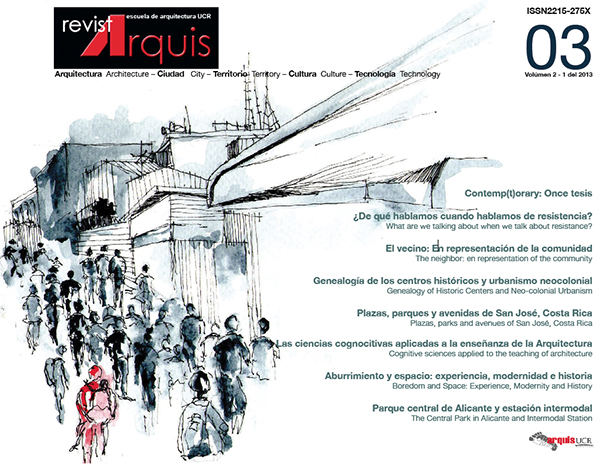Abstract
Resumen
El objetivo central de este ensayo es emprender una genealogía de los centros históricos urbanos (CHU) en el contexto latinoamericano del siglo XXI, siguiendo la perspectiva analítica-metodológica de Michel Foucault. Comprender cómo, por qué y cuándo surge la concepción de CHU y las prácticas asociadas a ésta, es fundamental para conocer el papel que cumplen las ciudades en las sociedades contemporáneas. Los CHU son, desde los años 1980, lugares de funcionamiento del capitalismo globalizado, principalmente de carácter inmobiliario, comercial y turístico. Ese capitalismo ha impulsado un urbanismo con concepciones y prácticas de ciudad que reproducen miradas, discursos y relaciones sociales de carácter colonialista, que se incrusta en las políticas de recuperación que impera en la actualidad de las urbes antiguas, así como en la lectura sobre la historia que hacen los grupos encargados de impulsar esas políticas. Como consecuencia, se generan nuevas otredades, desigualdades, racismos e interpretaciones etnocéntricas y eurocéntricas, que exigen y convocan la configuración de un urbanismo y de una antropología latinoamericana de la descolonización. Se espera en este ensayo contribuir a esa configuración y avanzar en la genealogía de los CHU, a partir de tres ejes de trabajo: reseñar algunas investigaciones recientes impulsadas desde una antropología urbana en la Universidad de Costa Rica, establecer los ejes del urbanismo neocolonial en los CHU y delimitar los momentos históricos detonantes del mismo.
Abstract
The main objective of this essay is to begin a genealogy of the historical urban centers (HUC) in the Latin American context of the XXI century, following the analytical-methodical perspective of Michel Foucault. Understanding how, why, and when does the HUC conception and related practices emerged, are essential in order to study the cities’ role in the contemporary social process. The ancient main urban centers are, since the 1980’s, places of operation of the globalized capitalism, mainly of a real-state, business, and touristic character. This capitalism has motivated an urbanism with concepts and practices of a city that reproduces looks, speeches, and social relationships related to a colonialist character. Which highly embed in the politics of recuperation that dominate in the modern times of the HUC, such as in the lecture of the history that create the groups in charge of promoting those statements. As a result, new inequalities, racial discrimination, and ethnocentric, and Eurocentric interpretations, that implore and request a configuration of a urbanism and a Latin American anthropology of the decolonization. The hope is to contribute to the achievement of this modification, and to progress in the genealogy of the HUC based on three themes: pointing out some recent investigations and their contributions from an urban anthropology at the University of Costa Rica, to state the central edges of the neocolonialist urbanism in the HUC and to delimitate the detonating historical moments of it.

